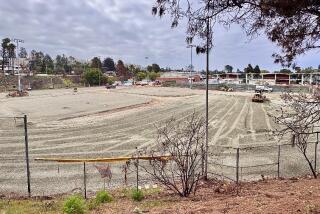Clean Up, Complete Belmont; Don’t Sell
- Share via
Recently, the Los Angeles Unified School District took the first tentative steps toward what many in the community have long wanted--completion of a safety study of the Belmont Learning Complex, mitigation of any environmental dangers on the site and completion of the partially constructed school.
Fifteen months after the school board decided to abandon the Belmont site, the district requested proposals on how the site could be used. This presents the possibility that, after wasted months looking in vain for alternate sites, the board might finally attend to the critical, decades-long need for schools in the Pico-Union area.
At the same time, the board also invited bids to buy the site for non-school use. The board should not pursue this option but instead should move ahead with cleaning up the Belmont site and finishing a school that will serve downtown-area students.
Proposing the idea that Belmont be sold, besides possibly drawing the issue into contentious and costly litigation, suggests that the board is in a quandary. It either knows that Belmont can be made safe but refuses to take leadership in completing the project, or it believes Belmont can’t be made safe but is willing to let a new owner take the risk of harming others.
And let’s face it, there’s no use that could be made of Belmont--whether it’s housing, retail or industrial--that would not expose many people, including children, to possible harm if the site remains toxic.
In fact, there is no way for the board to maintain its position that Belmont is too toxic to be made safe for schoolchildren that would also allow the ethical sale of the property to others.
Of course, it is possible that the board’s proposal to sell Belmont means that the board now believes that the site’s environmental problems can be solved.
This presents another ethical dilemma because, if it refuses to complete a school, the board will condemn thousands of Latino children who are living downtown to overcrowded year-round schools or two-hour daily commutes to suburban schools.
The board’s request for bids does make clear that a purchaser must hold the district harmless in future litigation. While this legal nicety might lessen the board’s liability concerns, it cannot render moral or just the choice to sell rather than build and open a school.
Indeed, indemnity may merely trade one lawsuit for another. By selling, the board indicates a lack of faith in its conclusion that the site is forever unsafe. This in turn invites any number of legal challenges as to why the board has abandoned a site in which it invested hundreds of millions of dollars, rather than completing a desperately needed school. Thus the hypocrisy of a sale would subject the board to liability for failing to serve the needs of students in this particular area of the district.
From every vantage point, the sale of Belmont is a losing proposition. We urge the LAUSD board to act immediately to remove the sale option from further consideration. The board must, instead, first make the site safe and then complete Belmont.
More to Read
Sign up for Essential California
The most important California stories and recommendations in your inbox every morning.
You may occasionally receive promotional content from the Los Angeles Times.













